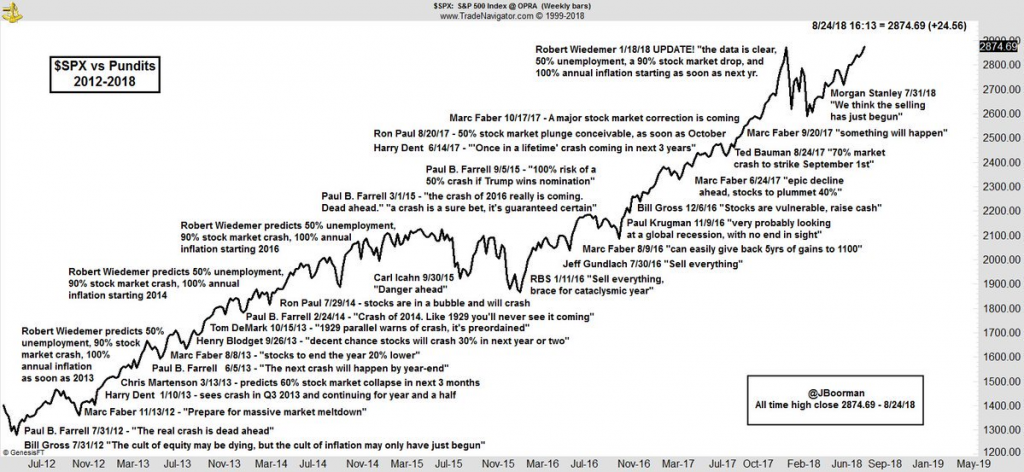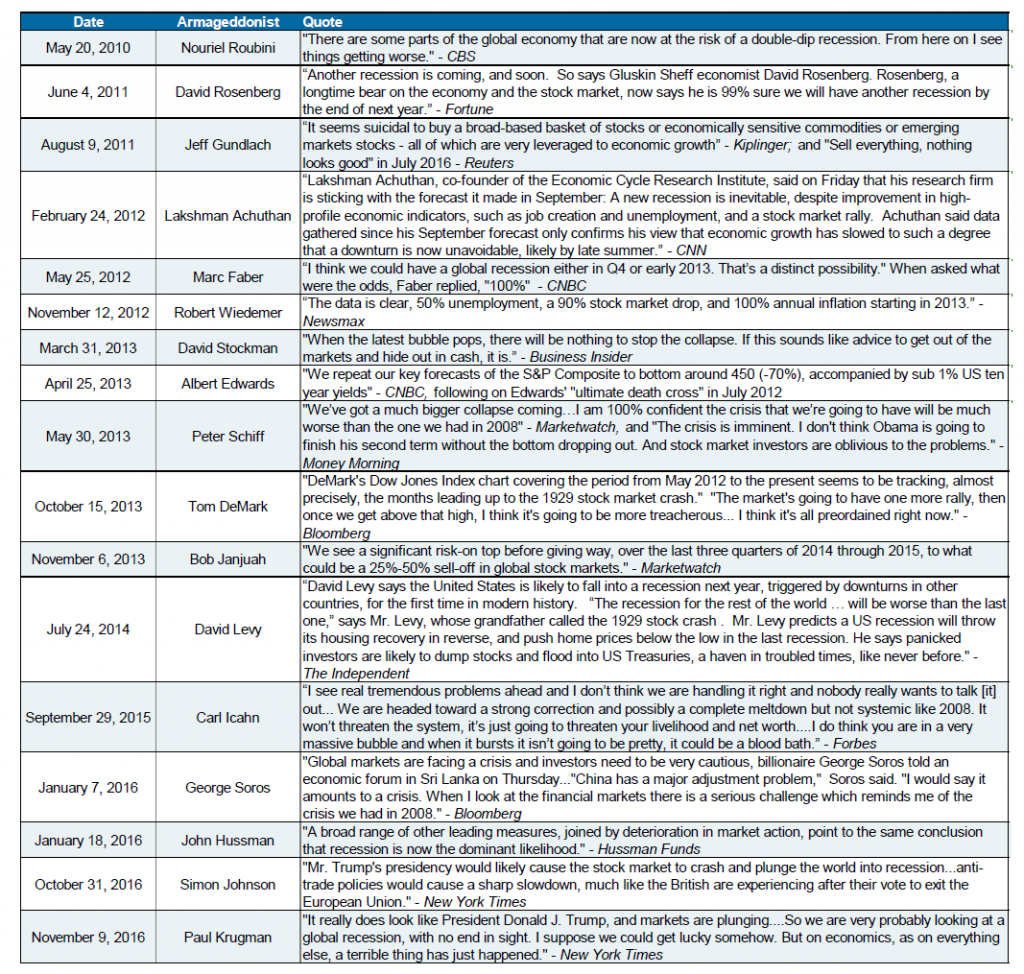
It is inevitable that at some point in time during your investment journey you will hear this warning…
The EXPERT who predicted the last market crash is predicting the next one!
Now here is how the template typically looks…



Now that you are familiar with the ‘scare-the-wits-out-of-you-template’ used by the media, let us move on to the most important thing – YOUR REACTION!
Here is a quick peep into your mind voice
OOPS! Let me EXIT my equity exposure immediately. If this famous investor who predicted the last crisis is warning again, this must be serious.
Now this is exactly how most of us would respond.
If you are nodding your head, welcome to the rest of us.
Getting worried when you hear something like this is perfectly OK. This simply means that – You and I are Human!
To get cautious and wanting to move out your hard-earned money out of equities is the obvious first instinct. After all, who wants to endure a market crash when there is a clear warning about what is coming.
But hang on…
There is something which these headlines never tell you.
WHAT REALLY HAPPENS IF YOU LISTEN TO THEM?
Before you decide to pull the plug, here is a humble reminder of what really happens…
Experts in March 2020 when the markets had crashed…



Source: JP Morgan, Creative Planning
What happened post that…



Now if you thought this was a recent phenomenon, hold your breath.
Presenting to you
Experts since 2008…



Source: Jboorman via Twitter, JP Morgan, White Oak Capital
What happens when you follow their advice?
Michael Sembalest from JP Morgan has done an interesting research where he has calculated the opportunity loss if you had followed the advice of the popular market forecasters.
Here is how it looks

Source: Link
The above chart shows the consequences of listening to their predictions.
Each bar shows the portfolio value derived from reallocating from equities to diversified fixed income on the date of the forecast, with a starting portfolio value of $100 on 01-Jan- 2010 till 13-Nov-2020. The chart compares the resulting portfolio values of the different doomsday forecasters (Roubini, Rosenberg, Gundlach, Faber & Achuthan, Wiedemer, Stockman & Edwards, Schiff & DeMark, Levy, Icahn, Hussman & Soros, Johnson & Krugman, and Janjuah) to the portfolio value as if one had invested in the S&P 500.
All of the portfolios for the experts are around $200 or lower, while the S&P 500 portfolio value is approximately $350.
Even a Broken Clock is Right Twice a day!
But despite overwhelming evidence against them, why do they still try to predict the markets?
The idea is simple.
Step 1: Predict a market crash
Step 2: If it happens soon, claim credit, write books, give interviews.
Step 3: If it doesn’t happen, no worries. Repeat Step 1 every year till you get it right.
Here is how that works…
Jeremy Grantham
Let us take the example of Jeremy Grantham, a reputed British investor and co-founder and chief investment strategist of Grantham, Mayo, Van Otterloo & Co. LLC (GMO), a Boston-based asset management firm. The firm oversees $100B for clients. GMO had more than USD 65 billion in assets under management.
He has been described as a ‘perma-bear’, and was among the first pundits to warn about the 2008’s Global Financial cirsis. Also, his net worth is roughly USD 1 billion as of 2021.
Here goes his latest warning in the start of 2020, which got a lot of coverage.

But what about the earlier warnings…Ah never mind…
Jeremy Grantham’s predictions during the greatest bull market ever in US…
- 2010: Have cash, wait for stocks to fall
- 2011: Stocks are ranging from unattractive to very unattractive
- 2012: 2013 will be a dangerous year for the stocks
- 2013: Much of everything is brutally overpriced
- 2014: Big stocks bubble will end brutally in 2016
- 2015: Markets ripe for a Major decline
- 2020: The Market Bubble Will Burst in Weeks or Months
- 2021: Waiting for the Last Dance
John Hussman
He is an American economist and hedge fund manager. He gained his popularity after predicting the Global Financial Crisis of 2008.
Here are some of his scary predictions…
- 2010: “Investors dangerously underestimate the risk of an abrupt and possibly severe equity market plunge.”
- 2011: “the expected return/risk profile of the stock market has shifted to hard-negative.”
- 2012: “The present menu of investment opportunities continues to be among the worst in history.”
- 2013: “stock returns prospectively are very low.”
- 2014: “What concerns us beyond valuations is the full ensemble of overvalued, overbought, overbullish conditions.”
- 2015: “Exit now.”
- 2016: “current extremes imply 40-55 percent market losses…. These are not worst-case scenarios, but run-of-the-mill expectations.”
- 2017: “the most broadly overvalued moment in market history.”
- 2018: “The music is fading out, and a trap-door has opened up in the floor, but they’re still dancing.”
- 2019: “a projected 50-65 percent market loss over the completion of this cycle is actually somewhat optimistic.”
- 2020: “The S&P 500 has to drop by about 57% from current levels to reach run-on-the-mill valuations.”
Marc Cuban (The Shark Tank guy)
Mark Cuban is an American billionaire entrepreneur and investor whose net worth is an estimated USD 4.3 billion. He is one of the main “shark” investors on the ABC reality television series Shark Tank.

Here are some of his scary predictions…

Marc Faber
Marc Faber is a Swiss investor based in Thailand. He is the director of Marc Faber Ltd, which acts as an investment advisor and fund manager.
Faber is credited for advising his clients to get out of the stock market before the October 1987 crash.

Source: Link
Here is what he has been upto in the last 12 years…


Here is someone you know pretty well…

Source: Livemint

Ahem! Ahem! And the list goes on…
The amount of predictions that we ended up collecting for this blog, we could go about actually publishing a book.
But I guess, you get the drift…
Irrespective of the experience and intelligence of all these experts, the end result was pretty much the same.
All were humbled by the market!
Imagine if your portfolio decisions were guided by these scary predictions…

Now let me be clear about one thing.
All these investors and forecasters are very intelligent people. Far more intelligent than me for sure. So this is definitely not about me being smarter than them.
This is a humble reminder that the Markets, driven by the collective intelligence of all of us, are a lot more smarter than any individual most of the time.
The futility of predicting markets in the short term in effect boils down to predicting the emotions of millions of investors. I have no idea how I will feel one hour from now, leave alone 1 year from now.
Imagine trying to predict and time the emotions of millions of investors on a consistent basis.
No wonder no one has been able to do it on a consistent basis as seen from the ample evidence.
While eventually all these experts will be rewarded with a market crash or recession (as these are a normal part of the stock market and economic cycles), as you saw above the opportunity cost of staying out of the market is far too high.
Here is how Peter Lynch the famous fund manager sums this up…
“Far more money has been lost by investors trying to anticipate corrections, than lost in the corrections themselves.”
The earlier we realise this humbling truth, the easier it is to ignore these doomsday forecasters and move on with our lives following our simple asset allocation based investment plan.
Next time you see such scary warnings, you know what to do – continue sipping your nice chai and trust your asset allocation and regular rebalancing to do its work.
If you still have some doubts – ‘maybe my advisor/fund manager may still be able to do it’ here is the last nail in the coffin.
It comes from the last person you would expect to tell you this – one of the most popular business journalists in India.
Parting Thoughts
While experts continue with their usual predictions, we remain focused on the things that actually matter to your long-term goals and are within your control…
- Your Goals
- Your Asset Allocation
- Your Investment Behavior (ability to stick to the plan)
Our endeavor is to guide you to get these 3 things right and help you stick to your investment plan both through the good and bad phases of the market. With time and patience, you will undoubtedly have a rewarding investment outcome.
As always, keep it simple and happy investing 🙂








